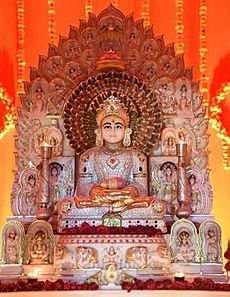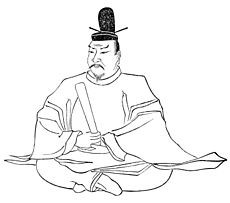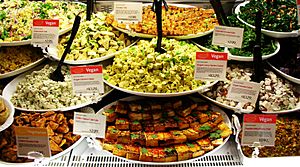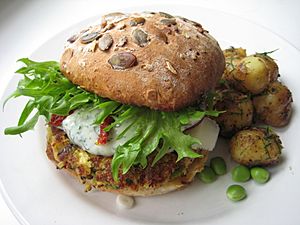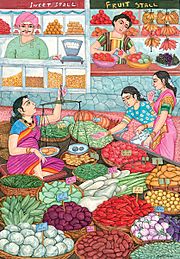Vegetarianism facts for kids
Quick facts for kids Vegetarianism |
|
|---|---|
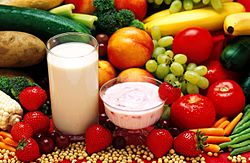 |
|
| Description | Diet derived from plants, with or without eggs and dairy |
| Varieties | Ovo, lacto, ovo-lacto, veganism, raw veganism, fruitarianism, Buddhist vegetarianism, Jain vegetarianism, Jewish vegetarianism, Christian vegetarianism, Sattvic vegetarianism |
Vegetarianism is a way of eating where people choose not to eat meat. This includes red meat, chicken, seafood, insects, and the flesh of any other animal. Some vegetarians also avoid animal products that come from animal slaughter.
People become vegetarian for many reasons. Some care deeply about animal life and believe it's wrong to harm animals for food. These ideas are often part of religious beliefs or animal rights groups. Other reasons include health, protecting the environment, cultural traditions, or simply personal preferences and taste.
There are different types of vegetarian diets:
- An ovo-lacto vegetarian eats both eggs and dairy products.
- An ovo-vegetarian eats eggs but no dairy.
- A lacto-vegetarian eats dairy products but no eggs.
- The strictest type is a vegan diet, which avoids all animal products. Vegans also often avoid using animal-derived products like leather.
Vegetarian diets can be very healthy. However, it's important to plan them well to get all the nutrients you need. For example, vitamin B12 is mostly found in animal foods. Vegetarians, especially vegans, might need to get B12 from fortified foods or supplements. Also, some packaged foods might have small amounts of animal ingredients, so it's good to check labels.
Contents
What Does "Vegetarian" Mean?
The word "vegetarian" first appeared in the early 1800s. Back then, people talked about a "vegetable regimen" diet. The word "vegetable" used to mean any edible plant. The modern word "vegetarian" combines "vegetable" (as in plants) with the ending "-arian" (like in "agrarian," meaning related to farming).
The term became popular when the Vegetarian Society was started in Manchester, England, in 1847. Before that, people who didn't eat meat were sometimes called "Pythagoreans" after the Greek teacher Pythagoras.
A Look at Vegetarian History
The idea of not eating meat goes back a very long time. One of the earliest records is from the 800s BCE in India. It taught kindness to all living things. In Jainism, a religion from India, leaders like Parshwanatha and Mahavira promoted ahimsa (non-violence) and Jain vegetarianism around 800-500 BCE. This is one of the strictest forms of vegetarianism.
In India, not eating meat has been linked to non-violence towards animals for thousands of years. Ancient texts like the Tirukkuṟaḷ (before 500 CE) clearly say that people should avoid meat and killing.
In ancient Greece and Egypt, people sometimes avoided meat for health or religious reasons. The Orphics, a Greek religious group, also promoted vegetarianism. The famous Greek teacher Pythagoras is often linked to vegetarianism, though he might have eaten some meat.
In Japan, in 675 CE, Emperor Tenmu banned killing and eating meat during busy farming seasons. These bans lasted for centuries but were lifted in the 1800s. In China, during the Song Dynasty, Buddhist cuisine became very popular. Vegetarian restaurants made dishes that looked and tasted like meat, using ingredients like tofu and seitan. Many meat substitutes we use today came from Chinese Buddhist cooking.
After the Roman Empire became Christian, vegetarianism mostly disappeared in Europe, except in India. Some monks in medieval Europe avoided meat but still ate fish. Vegetarianism became popular again during the Renaissance and grew even more in the 1800s and 1900s. The first Vegetarian Society was founded in the UK in 1847. The International Vegetarian Union was created in 1908.
In Western countries, more people became vegetarian because of health, ethical reasons, and later, environmental concerns.
Different Kinds of Vegetarian Diets
There are several ways to be vegetarian, depending on what foods you choose to include or exclude:
| Meat | Eggs | Dairy | |
|---|---|---|---|
| Ovo-lacto vegetarianism | No | Yes | Yes |
| Ovo vegetarianism | No | Yes | No |
| Lacto vegetarianism | No | No | Yes |
| Vegan diet | No | No | No |
Here are some other types of vegetarian diets:
- Fruitarianism means eating only fruits, nuts, seeds, and other plant parts that can be gathered without harming the plant.
- Macrobiotic diets mainly focus on whole grains and beans.
- Sattvic diet (also called yogic diet) is plant-based and may include dairy and honey. It avoids eggs, onions, garlic, and fermented foods.
- Veganism avoids all animal flesh and by-products like eggs, milk, and sometimes honey. It also includes avoiding products made using animal parts, like sugar whitened with bone char.
- Raw veganism is a vegan diet where food is not heated above 48°C (118°F).
Some vegetarians also avoid products that might use animal ingredients not listed on labels, or animal products in their making. For example, some cheeses use animal rennet (enzymes from animal stomachs). However, most rennet used today comes from plants or microbes, making it suitable for vegetarians.
Sometimes, people call themselves "vegetarian" but still eat fish or chicken. These are actually "semi-vegetarian" diets. True vegetarian groups, like the Vegetarian Society, say that vegetarianism means no animal flesh at all.
Religious and Spiritual Reasons
Many vegetarians around the world are Hindu. Both Hinduism and Jainism often teach vegetarianism. Buddhism may or may not include it. Some people in Western countries also choose a vegetarian diet to feel more connected to their inner spiritual side. Mahatma Gandhi believed that spiritual experiences are much better on a vegetarian diet.
Hinduism and Vegetarianism
Hindus often teach vegetarianism as a way to live with the least harm to other beings. About 20% of all Hindus are vegetarians today. India has more vegetarians than any other country, with around 200 million people who don't eat meat. More vegetarians live in Southern India, possibly because it's warmer there. For yoga and meditation, being vegetarian is often seen as helpful.
Hindus who believe in non-injury or non-violence (ahimsa) naturally choose a vegetarian diet. It's a matter of personal belief. Hindu scriptures explain that animals have souls. Killing animals is believed to bring bad karma, meaning the killer might suffer the same pain in the future. Some Hindu teachers say that eating meat, fish, and eggs can bring negative feelings like fear and anger into our bodies. The Manu Dharma Shastras say, "When the diet is pure, the mind and heart are pure." Hindus generally believe that the food we eat affects our personality, mood, and mind.
Health Benefits of Vegetarian Diets
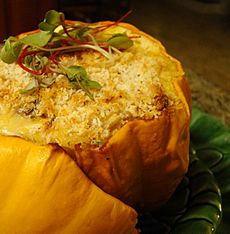
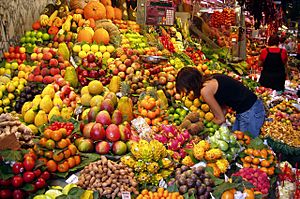
Many people in Western countries choose vegetarianism for health reasons. Experts like the American Dietetic Association say that a well-planned vegetarian diet can be healthy at all ages. It can also help prevent and treat certain diseases.
Vegetarian diets usually have less saturated fat, cholesterol, and animal protein. They have more carbohydrates, fiber, magnesium, potassium, folate, and vitamins C and E. These things are good for your health. Vegetarians often have a lower body mass index (BMI), which is a measure of body fat.
Bone Health
Some studies suggest that vegetarian diets might increase the risk of low calcium and weaker bones. However, a 2021 review found no major differences in growth between vegetarian and meat-eating children. It's important for vegetarians to make sure they get enough calcium.
Diabetes and Heart Health
Research is looking into how vegetarian diets might help people with type 2 diabetes. Studies have also shown that vegetarians may have a lower risk of heart disease and stroke.
Mental Well-being
Some reviews suggest a possible link between vegetarian diets and depression or anxiety, especially in younger people. However, other studies found no strong connection.
Overall Health and Life Expectancy
A 2012 study found that vegetarians might have a lower risk of dying from all causes. A 2017 review also found a lower risk of death from heart disease.
Getting Enough Nutrients
A well-planned vegetarian diet can provide all the nutrients a person needs, just like a meat-eater's diet.
Protein Power
Vegetarian diets usually have less protein than meat diets, but they can still meet daily protein needs for most people. Studies from places like Harvard University show that vegetarian diets provide enough protein if you eat a variety of plant foods.
Iron Intake
Vegetarian diets often have similar amounts of iron as non-vegetarian diets. However, iron from plants is not absorbed as easily as iron from meat. You can help your body absorb more iron by eating foods with vitamin C at the same meal, like oranges or tomatoes. Good plant sources of iron include black beans, lentils, spinach, and fortified breakfast cereals.
Vitamin B12
Vitamin B12 is usually found in animal foods. Lacto-ovo vegetarians can get B12 from dairy products and eggs. Vegans need to get it from fortified foods (like plant milks and cereals) or supplements. Not getting enough B12 can lead to health problems like anemia. The daily recommended amount of B12 for teens and adults is 2.4 mcg.
Healthy Fats (Omega-3s)
Plant sources of Omega 3 fatty acids include soy, walnuts, chia seeds, and flaxseed. These provide a type of Omega-3 called alpha-linolenic acid, which your body can turn into other important Omega-3s like EPA and DHA. Vegetarians and vegans often have lower levels of EPA and DHA than meat-eaters. Some algae like spirulina are also good sources of healthy fats.
Calcium for Strong Bones
Vegetarians and vegans can get enough calcium if they plan their diet well. Lacto-ovo vegetarians get calcium from dairy products. Non-dairy milks like soy milk and almond milk are often fortified with calcium. Other good plant sources include Broccoli, bok choy, kale, calcium-set tofu, and tahini.
Vitamin D
Your body can make Vitamin D when your skin is exposed to sunlight. Some foods like milk and cereals are fortified with vitamin D. If you don't get enough sun or fortified foods, you might need a vitamin D supplement.
Plant sources of vitamin D include some mushrooms that have been exposed to ultraviolet light.
Vegetarianism and the Environment
Environmental vegetarianism is about how producing meat and animal products affects our planet. Many believe that raising animals for food, especially in factory farming, is not good for the environment.
A 2006 report by the United Nations said that the livestock industry (raising animals) is a big cause of environmental degradation worldwide. It contributes a lot to air and water pollution, land degradation, climate change, and loss of different plant and animal species. The report said that raising animals for food is one of the top reasons for serious environmental problems.
Raising animals also creates a lot of greenhouse gases, which contribute to climate change. Some cities, like Ghent in Belgium, have even started "meatless days" to encourage people to eat vegetarian meals for the environment.
Working Conditions and Diet
Some groups, like PETA, promote vegetarianism because of concerns about how workers are treated in the meat industry. They say that working in meat processing can be very difficult and stressful for people.
Money and Diet
Economic vegetarianism is when people choose a vegetarian diet for financial reasons or because they believe it's a more efficient way to feed the world. The Worldwatch Institute suggests that if people in richer countries ate less meat, it would help with healthcare costs and improve public health. It would also reduce pressure on land and water resources, making grain more affordable for people who are hungry. Studies in 2016 estimated that more people becoming vegetarian could save a lot of money in global healthcare and environmental costs.
Images for kids
-
Sanitarium products for sale.
-
The food choices of Jains are based on the value of Ahimsa (non-violence).
-
At the Sikh langar, all people eat a vegetarian meal as equals.
See also
 In Spanish: Vegetarianismo para niños
In Spanish: Vegetarianismo para niños
 | Janet Taylor Pickett |
 | Synthia Saint James |
 | Howardena Pindell |
 | Faith Ringgold |


